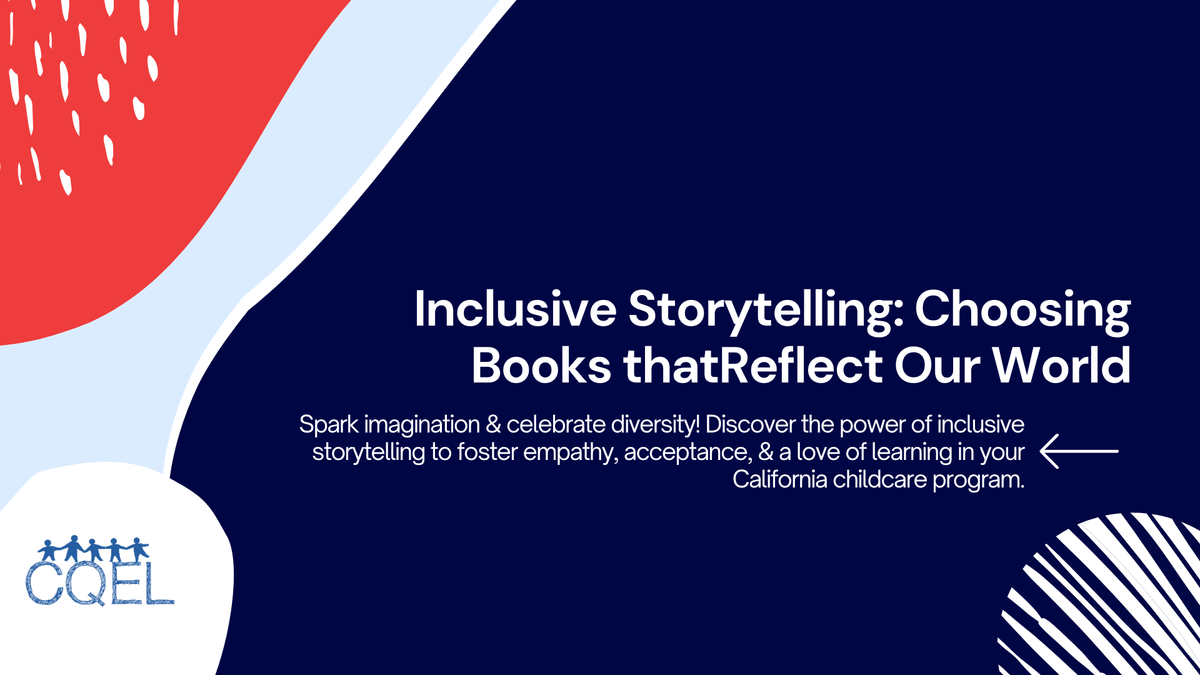Inclusive Storytelling: Choosing Books that Reflect Our World
Spark imagination & celebrate diversity! Discover the power of inclusive storytelling to foster empathy, acceptance, & a love of learning in your California childcare program.

Storytelling is a cornerstone of early childhood development. It sparks imagination, ignites curiosity, and lays the foundation for a lifelong love of learning. As an aspiring childcare provider in California, the books you choose for your young readers play a vital role in shaping their perception of the world. But what if the stories they encounter don't reflect the rich diversity of the children in your care? Inclusive storytelling, where characters and experiences mirror the beautiful tapestry of cultures and backgrounds, is essential for fostering empathy, acceptance, and a sense of belonging in all children.
Imagine a child who never sees a character that looks like them in the books they read. This lack of representation can contribute to feelings of isolation or exclusion. Inclusive stories, on the other hand, offer a powerful mirror for children. They see their own experiences reflected on the page, their identities valued, and their dreams validated. Beyond self-reflection, inclusive storytelling fosters empathy and understanding. Children learn about different cultures, family structures, and abilities, developing a sense of respect and appreciation for the richness of human experience.
So, how do you curate an inclusive book collection for your childcare setting? The first step is to prioritize diverse characters. Seek out stories that feature children from various ethnicities, races, and abilities. Look for books that depict different family structures, such as single-parent households or families with same-sex parents. Inclusive representation extends beyond ethnicity – include characters with disabilities or those who identify outside the gender binary.
But diversity is just one piece of the puzzle. Positive representation is equally important. Move beyond token characters and stereotypes. Choose stories that portray diverse characters in a well-rounded and empowering light. Are they the heroes of their own stories? Do they overcome challenges and achieve their goals? Authentic representation matters too. Look for books written and illustrated by authors and artists from the cultures they depict. This ensures a respectful and accurate portrayal of traditions, customs, and experiences. Consider the illustrations as well – do they reflect the diversity of the characters in the story?
Choosing inclusive books requires self-reflection. Be mindful of your own biases and assumptions when selecting stories. Step outside your comfort zone and explore genres and cultures unfamiliar to you. Collaboration with parents is another key strategy. Talk to them about books that reflect their children's cultural heritage and family experiences. Librarians are invaluable resources – local libraries often have curated collections of diverse children's books. Don't forget about online resources! Websites maintained by librarians or diversity experts offer extensive lists of recommended books.
Inclusive stories are more than just entertaining reads; they are springboards for meaningful discussions. Use story time as an opportunity to talk about diversity and acceptance. Encourage children to ask questions about the characters, their backgrounds, and the situations they encounter. Incorporate activities and crafts related to the stories to deepen children's understanding and appreciation of different cultures. Through inclusive storytelling, you can create a culture of inclusion in your childcare setting, where every child feels valued, respected, and celebrated for who they are.
California is a leader in promoting inclusive education. The California Association of Library Trustees and Advocates (CALA) offers curated lists of diverse children's books (https://scholarworks.calstate.edu/concern/projects/pr76fb134) specifically tailored for California classrooms. The Cooperative Children's Book Council (CCBC) website (https://ccbc.education.wisc.edu/literature-resources/ccbc-diversity-statistics/) is another excellent resource, offering a wealth of information and recommendations on diversity and inclusion in children's literature.
By fostering a love of inclusive storytelling, you nurture well-rounded and globally aware young minds. You equip them with the empathy and understanding needed to navigate our diverse world. Remember, the characters children encounter in books today can shape the world they create tomorrow. So, open a book, open a world, and open hearts to the beauty of inclusion.
